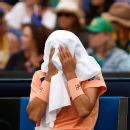MELBOURNE, Australia — Prior to coming to New Zealand and Australia this month, Ben Shelton had never left the United States. Now, his first trip overseas has been extended after he defeated rising Australian Alexei Popyrin in the third round.
“It feels great,” Shelton said of making the last 16 of a Slam. “I said on court it was a bit of a pinch-me experience.”
Shelton’s path to professional tennis began at the U.S. collegiate level, playing for the University of Florida in Gainesville, for the most part under the watchful eye of his father (and Gators coach), Bryan Shelton.
Bryan Shelton was a professional tennis player, winning two ATP titles in Newport in the early ’90s after a collegiate career at Georgia Tech. And while Ben initially didn’t want to take up tennis and follow in his old man’s footsteps, he relented at age 12, picking up a racket and embarking on a journey that would see them reunite in college.
And while it is often the case that talented young Europeans or Australians hit the pro circuits in their teens (you only need to look at the Fruhvirtova sisters in Melbourne this year), professionally, the 20-year-old’s career only really started to take off midway through 2022.
His breakthrough came at the Masters 1000 event in Cincinnati in August. Ranked No. 229 at the time, Shelton won two matches against top-60 opponents — beating Lorenzo Sonego in the first round, but crucially against Casper Ruud in the second round for his first win against a top-5 opponent.
He decided in August that he would leave the Florida program to go pro, and the big-serving left-hander then got a taste for Grand Slam tennis — a first-round loss to No. 104-ranked Nuno Borges in five sets.
Those who had been watching Shelton’s progress knew rapid improvement (and a rapid rise up the rankings) was coming. After his US Open debut, he rattled off consecutive Challenger Tour tournament victories in Charlottesville, Virginia, Knoxville, Tennessee, and Champaign, Illinois, accounting for a number of players in the top 200 and showing the world he was ready for a step up in quality and opponent.
Cue, the passport.
“There were players inside of the U.S. that could challenge me and beat me every week, and I wasn’t winning every single USTA tournament that I was playing. So my dad’s thoughts were, ‘I’m improving here, I’m not the best in the nation, and so there’s not really a reason to go to a different country where I probably would lose and learn a…
Click Here to Read the Full Original Article at www.espn.com – TENNIS…

